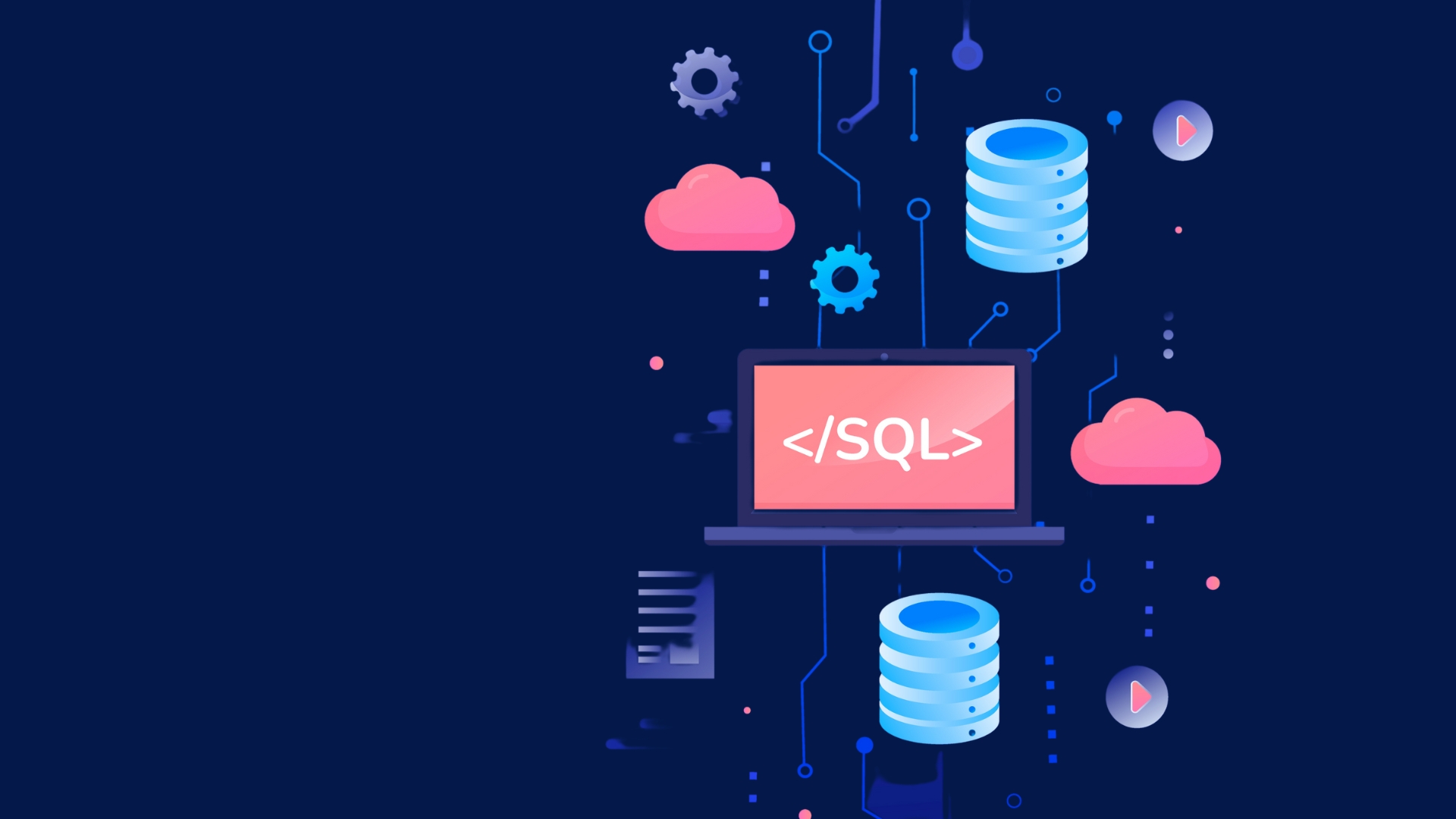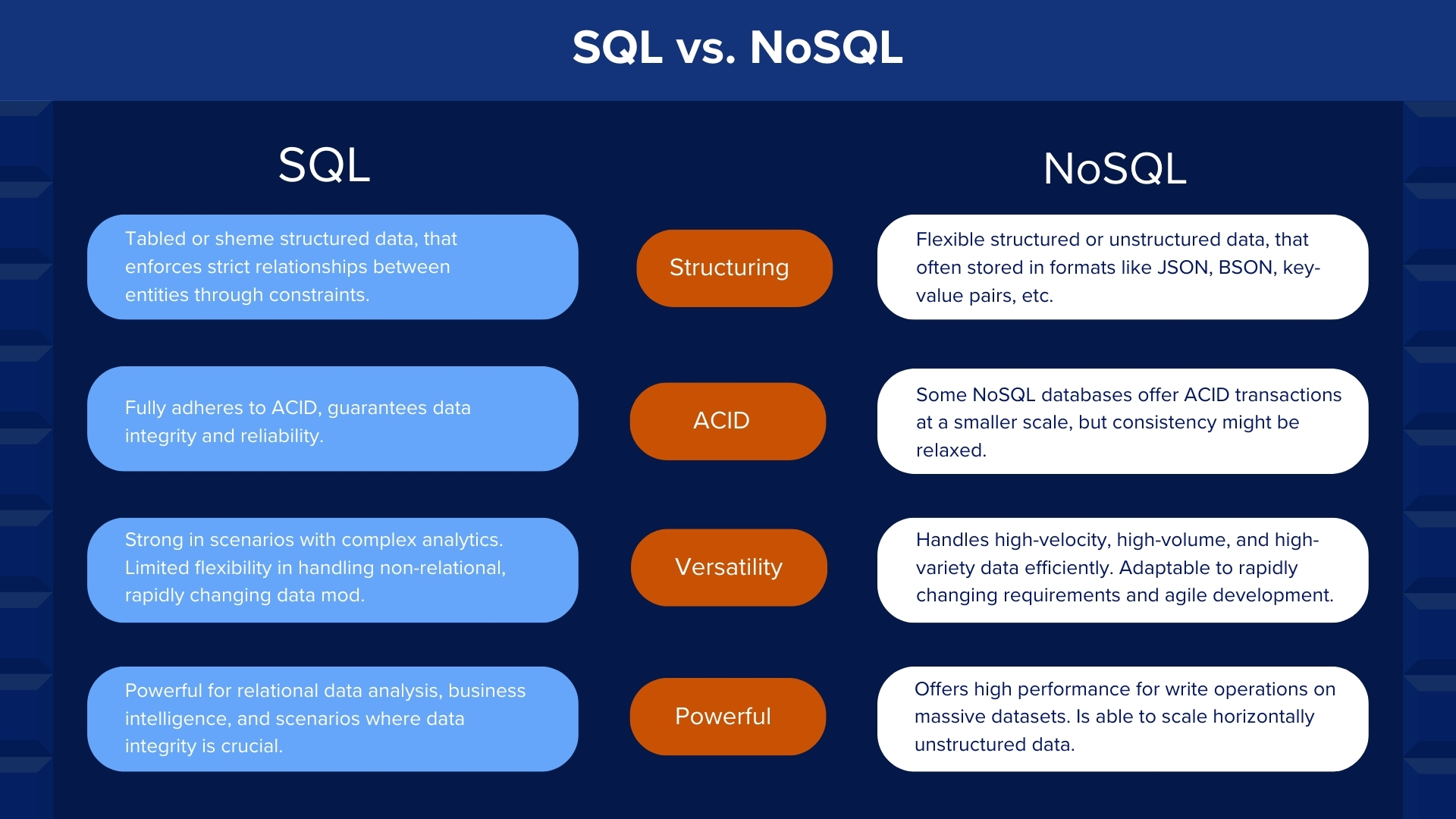SQL vs NoSQL Databases: What’s Best for Your Project


In the world of modern technologies, databases play a key role, as they serve as the basis for working with information in a wide variety of fields. Ranging from online stores and financial systems to social networks and analytical platforms. They provide not only reliable data storage, but also their fast processing and convenient appearance.
The choice between SQL and NoSQL databases can affect the key indicators of your system. Including performance, scalability, reliability, and ease of development.
SQL and NoSQL represent two different approaches to data organization. To make an informed choice, it is important to understand the basic principles of each of these systems, as well as their strengths and weaknesses.
Each project is unique, and database requirements may vary depending on the data structure, scalability, and complexity of operations. An erroneous choice of a database can lead to a decrease in the efficiency of the system, difficulties in development and increased maintenance costs. Thus, understanding the difference between SQL and NoSQL is the basis for successful development.
What is SQL?
If you are wondering: “is SQL a relational database?” – the answer is yes. SQL (Structured Query Language) is a Structured Query Language that is used to work with relational databases. Tables are used by relational databases like MySQL, PostgreSQL, and Microsoft SQL Server to hold data with clearly defined relationships between them.
Use Cases for SQL Databases
SQL databases are utilized in projects where the data structure is clearly defined and a high level of control over their integrity and consistency is required. SQL is perfect for working with data that has fixed and predictable associations because of its architecture, which emphasizes the use of tables with a precisely specified structure.
Examples of SQL database applications:
NoSQL (Not Only SQL) is an approach to databases that allows you to work with unstructured and poorly structured data. If we consider non-relational database vs relational, NoSQL offers a more flexible model that is suitable for modern high-load applications.
There are several types of NoSQL databases:
NoSQL databases are ideal for projects that require working with large amounts of data, high processing speed and flexibility in changing the data structure. Their architecture is oriented towards horizontal scalability. NoSQL database example can be a system that works with big data, for example, a recommendation system or a social network. These databases are suitable for applications requiring horizontal scalability and high availability.
Another striking illustration of the use of NoSQL databases is social networks. NoSQL databases are also frequently utilized in Internet of Things (IoT) systems, where devices produce massive volumes of data in real time. They offer the scalability and flexibility required for contemporary applications involving complicated structures and large amounts of data. Also, Big data analysis projects frequently use NoSQL databases, such as when analysing logs or working with data streams. In fields where conventional relational databases are limited, these kinds of solutions are starting to become the norm.

| Performance and scalability | Data Integrity and consistency | Development and maintenance |
| When it comes to NoSQL vs SQL performance, NoSQL often outperforms SQL in scalability and speed of working with large amounts of data. While working with limited volumes of strictly structured data, SQL databases offer consistent speed. | SQL systems offer ACID transactions, which ensures excellent data integrity. NoSQL, on the other hand, provides eventual consistency, which can be suitable for applications with a high load. | The data schema must be strictly followed while using SQL databases, which can make development more difficult. Why choose NoSQL over SQL? When it comes to altering the data structure, NoSQL offers greater flexibility, which facilitates development and scaling. |
Recap of Key Differences To better understand the differences between them, it is worth comparing the key features. When it comes to NoSQL vs SQL, the main differences can be reduced to the following aspects:
Strict schema requirements for SQL data organization provide your data with a clear framework and let you manage intricate relationships. On the other hand, NoSQL is a great option for handling changeable or unstructured data since it provides flexibility because it does not have a strict schema.
SQL databases are appropriate for applications where transaction reliability is crucial because of their emphasis on stringent data consistency. In contrast, NoSQL places a higher priority on scalability and high availability, which is particularly crucial for applications with heavy loads.
Applications having a clear data structure, like order management systems and banking applications, are typically where SQL is utilized. Social networking platforms and recommendation systems are examples of contemporary high-load systems that use NoSQL databases.
If we consider NoSQL databases compared with SQL databases, it becomes obvious that the choice of the appropriate technology depends on the specifics of a particular project. SQL is suitable for applications that require reliability and strict structure. While NoSQL handles large amounts of data and complex, dynamic scenarios better.
With the rapid development of technology, databases continue to evolve and offer new business opportunities. In the future, we can expect the emergence of hybrid systems that combine the benefits of NoSQL vs SQL, while providing a strict data structure and flexibility in their processing. Increased scalability, enhanced performance, and high data reliability will be the key goals of database development in order to satisfy the expanding demands of contemporary applications.
The particulars of your project will determine whether to use SQL or NoSQL. SQL databases are the ideal option if you are working with data that needs to be strictly structured and consistent. NoSQL will be a better choice for applications that value scalability, flexibility, and high availability. Understanding when to use SQL vs NoSQL allows you to make an informed choice and avoid common mistakes related to performance and costs.
PNN Soft offers professional database development and integration services, including deep analytics of your needs. We will help you determine the optimal solution, whether it is SQL or NoSQL, considering all aspects of your project. Our team specializes in creating scalable, reliable systems that meet modern business requirements and support the growth of your product.
Fill out the form below, and we will contact you for a detailed consultation.